Karma chameleon and international jazz legend Herbie Hancock tells Janet Christie about his Edinburgh International Festival debut
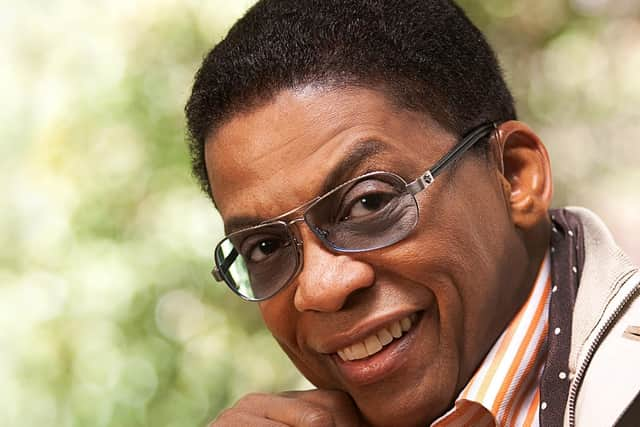

An octogenarian musical icon owning the Pyramid stage at this year’s Glastonbury, playing hits from a back catalogue that spans a lifetime, who inspired some of today’s top acts and has millions of fans. No, we’re not talking about Paul McCartney but jazz legend Herbie Hancock, the 82-year-old who with the Glasto gig and another at the Barbican in London as part of a summer of dates ticked off, is heading to Scotland for the first time in 17 years to make his Edinburgh International Festival debut at the Playhouse next month.
“We played in Edinboro… once maybe twice before and I’m looking forward to it, you know. There’s something kind of magical about Scotland. I think it’s all the old stories that we hear about it,” he says and laughs.
Advertisement
Hide AdA genre-bending musician and keyboard player famed for his acoustic and electronic jazz sounds, his influence spans R&B, funk, hip-hop and dance music with hits such as Cantaloupe Island, Watermelon Man, Maiden Voyage, Chameleon and the 1980s megahit Rockit, which brought DJ scratching into mainstream attention and inspired a generation of rappers - Snoop Dogg and Mixmaster Mike from the Beastie Boys have credit him as a life-changing influence and have performed his music.
A pianist from the age of seven, the keyboard chameleon made his name in the jazz world working with trumpeter Donald Byrd, Miles Davis and Blue Note, moved on to jazz funk with Head Hunters, and always a techno geek, was a pioneer of synthesisers, electric pianos and keytars. This led to his Future Shock in the 1980s and working with hip hop artists as well as the likes of Joni Mitchell along the way, to whom his 2007 album, River: The Joni Letters, paid tribute, with Norah Jones, Tina Turner and Corinne Bailey Rae adding to the vocals.
Having amassed hundreds of awards, including 14 (one for River) Grammys and an Oscar for Round Midnight in 1986, Hancock is still creating, with his next album being produced by Terrace Martin and due to feature a broad variety of musicians including Wayne Shorter, Kendrick Lamar, Kamasi Washington, Thundercat, Flying Lotus, Lionel Loueke, Zakir Hussein and Snoop Dogg.
Based in LA, Hancock comes on the phone, his deep voice unmistakeable, and keen to talk about his forthcoming Edinburgh show, part of a European tour that saw him and bandmates James Genus, Lionel Loueke, Justin Tyson playing in the UK and which will end up back in LA. Will he be playing the same sunny set, heavy on the jazz funk numbers, some more recent sounds, and Cantaloupe Island, Watermelon Man, Chameleon and Rockit in the mix?
“Probably,” he laughs, an easy rumble that erupts often throughout our interview. “It’s basically the same set for the whole tour, but it’s always possible there may be some changes.”
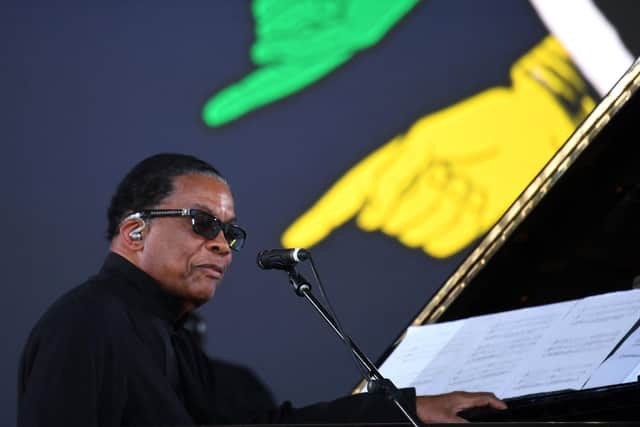

With a six-decade career and vast back catalogue to choose from, how does he select what to play?
Advertisement
Hide Ad“Well, it’s not so easy,” he says. “One of the things that I created along with Terrace Martin who is the producer of this record I’ve been trying to finish for the past ten years, is a kind of overture that we start the concert off with. It has fragments of several songs, some of which I will be playing as whole pieces later on in the show, but there are other fragments of things people want to hear but I can’t play all of. I just can’t play everything that people want to hear,” he chuckles. “But this is my way of giving at least something to them that they might want to hear, at least a part of the melody. They’ll hear that in the beginning of the show.”
With so many fan favourites, Hancock is an old hand of giving people what they want, and always the innovator, keeps it interesting for himself with a variety of arrangements that makes them fun for him to play. Which are the ones people want to hear most?
Advertisement
Hide Ad“Well, Chameleon, which we actually play as sort of an encore piece, that’s the last track that people hear. It’s fun. It’s a very simple piece in a lot of ways, but the way this group delivers it, we don’t keep everything just that simple. We do a lot of things that are a lot freer within the performance of that piece. We try to not just play the groove and the bluesy notes, but also kind of go in and out of more advanced playing. And that’s fun for me to do too, you know, on a piece like that, to kind of go out there for a minute and then come back, yeah.”
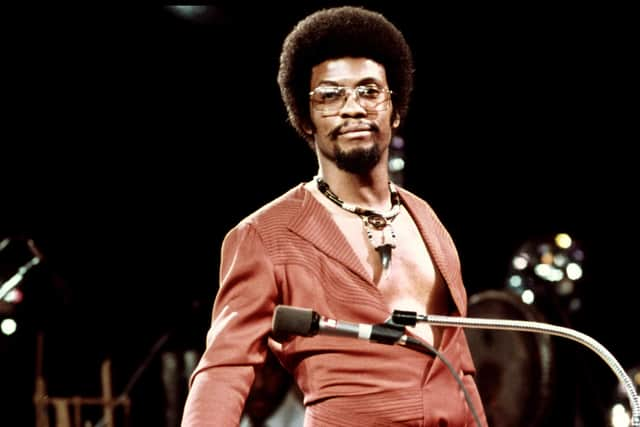

Never one to stand still, would he say that his ability to innovate is the key to his music?
“Um, maybe,” he laughs. “Yeah. I mean I like to have that in any delivery. It’s part of me. You know I always like to try new things and never just stick with the same way of doing things. I would get bored. I have to find new approaches to even old pieces, and we do that.“
When I ask Hancock what has been the highlight of his career so far, his answer demonstrates his ability to take you off on a fascinating tangent that ultimately brings you back to his music.
“I assume you’re only talking about the musical part, but you know I have to tell you this… Because I started playing piano when I was seven years old, through my whole life I always thought of myself as being a musician, from the beginning. But in 1972 I started practising buddhism and something like maybe eight or ten years later, while I’m practising buddhism every day, one day I was chanting and I was just thinking about the joy of being a musician but then I started thinking about my wife and my daughter and all of a sudden I realised - to my wife I’m not a musician, I’m her husband - yes she knows I play music, but I’m her husband - and to my daughter, I’m her father. Then I started to realise to my parents, whether alive or dead, I’m their son, but I’m also a neighbour, I'm also an American, I’m an African American. I’m also a global citizen.
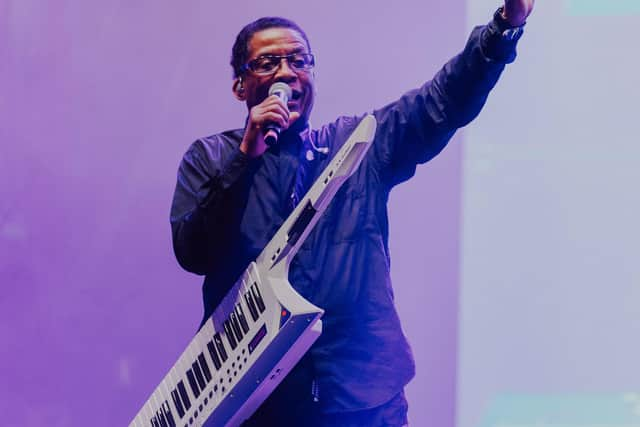

“You know we human beings have so many more aspects of ourselves besides the things we may be known for, or besides the career that we took, whether it’s being a dancer, a doctor, so that’s only one aspect. But what has all of those aspects together? And the answer came to me right away, and I know it came through buddhism, it’s the fact that I’m a human being. That’s the only thing that links them together.”
He pauses, then continues his theme.
Advertisement
Hide Ad“So now I define myself as a human being. What I do is play music. But what I AM is a human being, just like everybody else, and I try to treat everyone with the same kind of respect that I hope to be treated with, and to look at human beings on that same plane. But I also realised that every human being is unique and every human being exists because there is something that they were born here to do, their mission. They may accomplish their mission without even knowing what it is, or they may discover what that mission is, but every human being should be treated with respect because every human being is not replaceable. There’s no replacement for you. And there’s no replacement for me. There’s only one of you and there’s only one of me.
“So that really helped me in my interaction with other human beings and for me to work on my humanity, not just on my music. That’s the main thing. To be a better person today than you were yesterday, and a better person tomorrow than you are today. I got that from buddhism.”
And does he think it makes him a better musician?
Advertisement
Hide Ad“Yeah,” he says. “Well, I mean that’s one way that perhaps I can contribute to joy. You know, people enjoying the music, it helps them sometimes during the dark times in their lives. Music and the arts can create a light for people, to help them”.
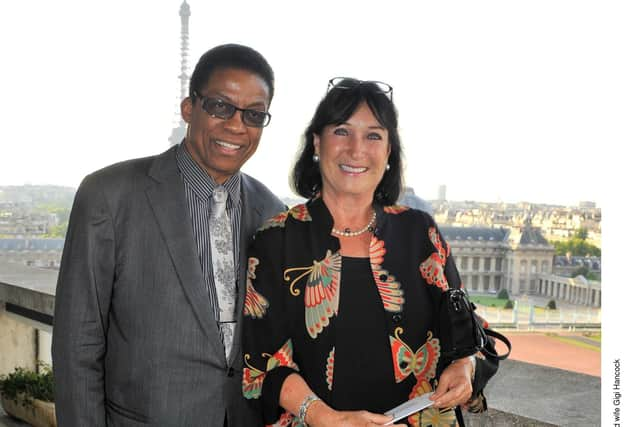

What’s impressive about Hancock is his reach to the younger generation with the next album featuring musicians from jazz to hip-hop artists. What does he think is the reason people want to work with him?
“Well Snoop Dogg for example. He told me that Rockit, that song that came out back in the 80s, that changed his life. And that’s what made him become a rapper. And the DJ Skrellix told me that Rocket is what made him become a DJ. They’re not as young as they used to be, but they’re younger than I am,” he laughs, “and so I guess some of the music I did in the past affected them and was one of the elements that helped change their life’s work and I feel really good about that, you know. I was able to accomplish that. It wasn’t just a win for me, it was like a win-win, because it helped them to win in their lives too”.
Hancock has worked with so many great musicians over his 60 years in the business, but who stands out for him most?
“Well, those musicians that trained me and encouraged me, helped me, and part of their influence is in everything that I do, so that connection is here. I wouldn’t be able to play the music that I play if it wasn’t for the influence of Ravel, Miles Davis, Bill Evans, and even my own contemporaries like Chick Corea - he’s been an influence on me too. So, it’s like everybody is part of the story.”
Hancock referencing Ravel takes us back to his starting to play piano at the age of seven, after the arrival of a piano in his home in Chicago saw him go on to be classically trained, playing with the Chicago Symphony Orchestra when he was 11.
Advertisement
Hide Ad“My parents bought me a piano for my seventh birthday because my mother had noticed that I seemed to be interested. My best friend, who lived in another apartment in the building where we lived, my mother noticed I would always go up to his apartment and ask him about playing the piano. I couldn’t play it but I wanted to play, so she noticed it and she wanted her children to have culture so that was the opportunity and my parents bought a piano. It was for the family though, and my older brother and my younger sister and I all started taking lessons, but I was the only one that continued and went on to become a musician.”
While music was an influence in the household of Winnie Belle, a secretary, and Wayman, a government meat inspector, their children were also all interested in science and technology.
Advertisement
Hide Ad“The interesting thing is that my sister and my brother both went towards the path of technology. It was the beginning of the early part of the computer age. My brother was studying that in school and college and my sister also followed that path, and I was always interested also in science from even before I was playing, before I got my piano. I’ve always been curious about putting things together to find out how they worked. That’s been my basic thing. So at college I actually first studied electrical engineering for two years but then I was spending much more time learning jazz and changed my major to music. So when synthesisers came in I was not afraid of them, I welcomed them. And when computers came in, I got my first computer in 1979 - I still have it by the way.
“I just had this feeling that computers were going to be very, very important for music in the future and I told all the musicians I knew ‘get a computer, find out how it works because it will come in handy in the future’. And they did. That’s basically my interest, that’s why I do all the things with synthesisers. Yeah, I’ve used a lot of synthesisers over the years since and of course it was exciting. But my main instrument is still the acoustic piano.”
Surprisingly, for a keyboard player and someone who is a professor of music at the University of California, Los Angeles and is chairman of the Herbie Hancock Institute of Jazz, Hancock hasn’t amassed multiple pianos.
“I actually only own one real piano,” he says. “And I recently bought two toy pianos - one is really a toy, the other one actually does make piano sounds - for my grandson. He’s 15 months old, and he recently learned to walk, and now he’s running, but he loves music, and he seems to love the piano.”
As for the new album, which Hancock says he has in fact been working on for the past ten years, what can he tell us about it. Kendrick Lamar has been mentioned…
“Well, Kendrick Lamar is not on my record yet. He came over to my house and we talked… actually he even chanted with me, we did that. I showed him how to chant nam-myoho-renge-kyo, and he did. And we’re looking for what we hoped would be the right material for him, something that he might be interested in but we haven’t really found it yet. But Snoop Dogg is on one of the tracks and I’m very happy to have him as an addition to the personnel on the record.”
Does it have a name yet?
Advertisement
Hide Ad“Yes, I do have a name for it,” he says and pauses. “But I’m not going to tell you yet,” he adds and laughs some more.
Herbie Hancock performs at the Edinburgh Playhouse on Sunday 7 August as part of the Edinburgh International Festival. Tickets are available at eif.co.uk.